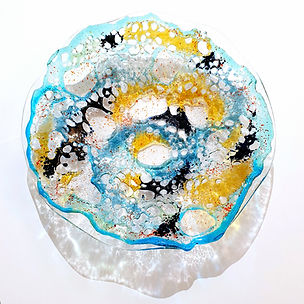Kiln-formed glass made in Sussex by Becky H
Pricing your work is a constant hot topic amongst artists. We have all seen people walk away because they love something but genuinely cannot afford it. We also often hear conversations about whether potential customers think something is worth the price being asked.
This page takes you through all the elements that I consider when I price my work. There is a specific example at the bottom of the page here.

Buckle in for a pricing breakdown!
Materials - These are things that are used in every project
Glass - Sheet, crushed / powdered, enamel powders, glass mixing mediums
Kiln wash / separator
Kiln paper / separator
Fibre paper - 1mm, 3mm, 6mm
Mould-making materials - Silkemat blanket, Rigidiser
Silicon carbide grinding grits
Wet/dry sandpaper
Glass cleaning spray
Pens / paper for design, planning and sizing
Packaging - Boxes, protective wrapping, business cards / branding materials. Eco-friendly packaging materials tend to be more expensive.
Electricity - on average, one firing is 7-12 units of electricity. Most of my pieces need three or four firings each.
EQUIPMENT & TOOLS - These are things that depreciate or need replacing over time
Kiln - Relays, elements, thermocouple and ceramic bricks
Kiln shelves, props and dams - These items can chip and degrade
Glass scoring and cutting wheels
Glass breakers and pliers
Cutting surfaces / mats
Mark-making tools
Powder sifters
Gauntlets / high heat resistant gloves
Protective glasses for looking in the kiln (a bit like looking at the sun!)
Glass grinding surfaces
Diamond coated hand-grinding pads
Small diamond-coated tools grinding for tight corners
Jewellery hammers - for removing the rims of drop out vessels
Dremel cordless tool with diamond wheels and burrs - for drilling holes in glass and cutting the rim off thick-walled vessels
Respirator masks for working with powders and grits
Air purifier filters
HEPA vacuum, filters and bags
DEVELOPMENT COSTS
For every new design there is at least one prototype. Many of these prototypes will have faults and won’t be suitable for sale, but will have taken the same amount of time or longer to make than a finished, final piece.
Learning and development - Courses on specific techniques
EXHIBITION COSTS
Exhibition fees - In galleries, you pay a fee to rent space for a period of time.
Application fees - For Open Call exhibitions there will usually be an application fee. This is not refundable, even if your work isn’t accepted into the exhibition.
Commission - This is a percentage of the sale price, taken by the gallery or exhibition. Commission varies between venues and is anywhere between 15% and 50%. This is in addition to any exhibition or application fee already paid.
Display props - Risers, racks, table coverings, plinths. These are not usually provided by venues.
Petrol / Travel - Got to get it all there, set it all up and take it down again!
ADMIN
Labels - Printing, cutting, writing
Website - I run my own!
Social Media - This takes a surprising amount of time
Record keeping and tax returns
MAKING TIME
Time spent making is something that a lot of artists don’t account for; properly valuing our skills and professional worth is a constant topic of conversation. There is information about acceptable rates of pay on the Artists Union England website here Rates of Pay - Artists' Union England
On average I will spend 4-6 hours actively working on a medium to large size piece. By ‘actively working’ I mean, cutting and laying up the design, programming the kiln, checking on the glass in the kiln at key points in the firing process, and ‘cold working’ ie removing the rim from a vessel then grinding, smoothing and refining it using hand tools. The final price also reflects the elements above.
An example
Materials:
30x30cm Tekta sheet: £8
200g glass powders (multiple colours): £11.60
Thinfire shelf separator paper changed for each firing: £5.20
Fibre paper for lining the drop mould: £1.11
Silicone Carbide grit for grinding the rim: £1.85
Firing cost:
4 firings. Total 35 units electric: £9.10
Depreciation (thing that wear and will need replacing):
Kiln relays
Handmade mould
Diamond hand grinding pads and grinding surfaces
Cutting tools
FFP3 mask (to protect lungs from sifted glass powders)
Gallery display items (plinth, price tags)
Nominal £2
Active working time:
4 hours: £80
Packaging:
Box, tissue paper, glass care card, business card: £4
Other:
Proportion of fee to show in a gallery: £4.80 (£48 gallery fee, 10 items shown)
15% commission on sale price if item sells: £24.75
Petrol cost to deliver / collect item: £15
Total: £167.41
Gallery price: £165

